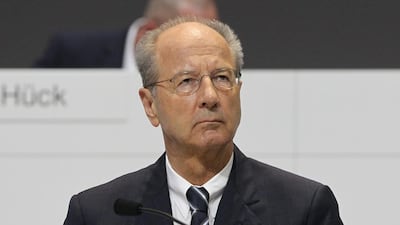Volkswagen’s efforts to emerge from the diesel-emissions scandal have been dealt a double blow after German prosecutors extended their inquiry to the chairman Hans Dieter Poetsch amid reports Audi installed additional cheating software in some of its cars.
Europe’s largest car maker has struggled to extricate itself from the crisis, which erupted in September 2015 after Volkswagen admitted to rigging about 11 million cars worldwide to cheat on emissions tests. Mr Poetsch, who was chief financial officer when US authorities were investigating, was installed as the chairman in the aftermath of the revelations to help stabilise the company. Audi, which developed some of the engines involved in the scandal, is the group’s biggest profit contributor and is critical to Volkswagen’s recovery plan.
In an investigation into allegations of market manipulation, German prosecutors named Mr Poetsch as a third suspect after interviewing more witnesses and examining “other sources”, said Klaus Ziehe, spokesman for the Braunschweig prosecutors’ office. “Initial evidence” suggests that Mr Poetsch may have been involved, he said.
In the United States, environmental authorities in California discovered that certain Audi petrol and diesel models include software that direct the engines to burn less fuel and emit less carbon-dioxide on test stands than on the roads, Germany's Bild newspaper reported. The findings made over the summer apply to automatic-transmission cars including the Audi A6 and A8 saloons and the Q5 4x4, the newspaper said. Audi had stopped installing the defeat devices in new vehicles by that time, Bild said.
When the steering wheel of those vehicles was turned more than 15 degrees, as if backing out of a parking space, the emissions-limiting software disengaged, Bild reported. An Audi spokesman declined to comment on the Bild report, citing ongoing negotiations with authorities.
Volkswagen reasserted its position that management “fulfilled its disclosure obligation under German capital markets law”, it said. Meanwhile, Wolfgang Porsche, the head of the industrial clan that controls the majority of Volkswagen’s voting shares, said the families “absolutely stand behind Mr Poetsch”.
Mr Poetsch was the chief financial officer of Volkswagen from 2003 to 2015 and also sits on boards at the Porsche and Audi units. The market-manipulation investigation by Braunschweig prosecutors is also targeting the former chief executive Martin Winterkorn and the VW brand chief Herbert Diess over how they disclosed the scandal to investors.
While Volkswagen has settled civil penalties in the US related to rigged 2-litre diesel cars and is recalling those vehicles in Europe, issues related to larger 3-litre motors remain unresolved. The discussions relate to about 80,000 cars with diesel engines developed by Audi. By secretly adjusting how cars performed under test conditions versus on the road, Volkswagen was able to market diesel engines’ efficiency while not sacrificing driving performance.
* Bloomberg
business@thenational.ae
Follow The National's Business section on Twitter

